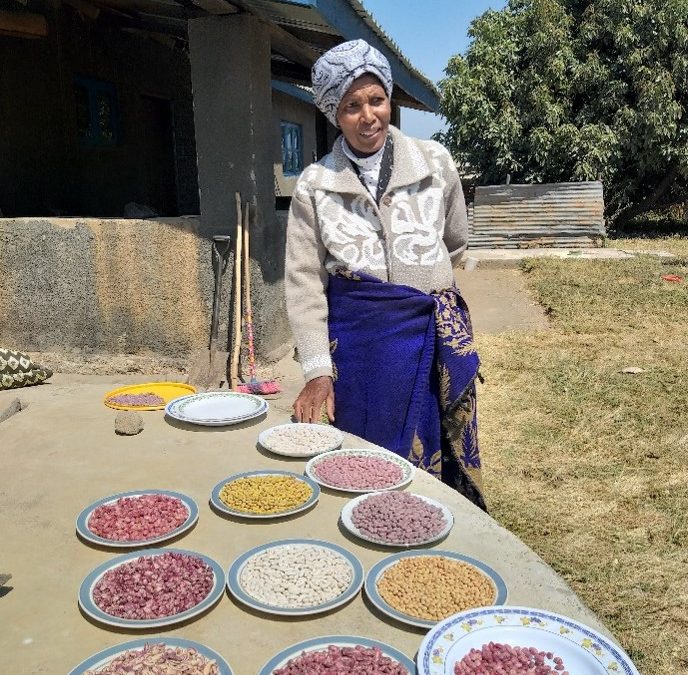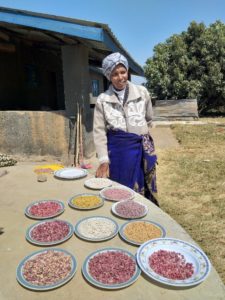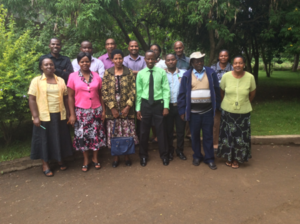Dr. Catherine Madata – the bean legend in Tanzania
Authors: Sylvia Kalemera, Agnes Ndunguru, Fadhili Kasubiri, Radegunda Kessy
Eleven years after retirement, Dr. Catherine Madata is still doing active breeding work, a demonstration of how passionate she is about keeping food on the table. By continuously making research better.
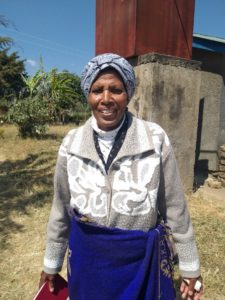 Dr. Madata started her career at Tanzania Agriculture Research Institute (TARI) in 1975 after graduating with a Doctor of Philosophy (PhD) from the Michigan State University in the United States of America. Initially, she started with Cowpeas and Maize, before concentrating on common beans from the 1980s.
Dr. Madata started her career at Tanzania Agriculture Research Institute (TARI) in 1975 after graduating with a Doctor of Philosophy (PhD) from the Michigan State University in the United States of America. Initially, she started with Cowpeas and Maize, before concentrating on common beans from the 1980s.
To date, she has developed and released 20 bean varieties (7 were released after her retirement). Of the 20, 10 bean varieties are very popular in Tanzania among traders. These beans have been traded across countries of Angola, Democratic Republic of Congo, Kenya, Malawi, Zambia, South Africa, and in Middle East. These beans have generated income to various smallholder farmers in Tanzania and created investment opportunities for both seed and grain off takers within and beyond the continent
Dr. Madata’s record is yet to be beaten since no other common bean scientist in Tanzania has surpassed her releases. Uyole 03 is one of the most demanded and traded of the varieties she has released. It is the most grown variety in Southern Tanzania and is exported mostly to Southern African countries by traders such as Raphael group who work closely with PABRA. It is interesting to note that Uyole 3 still outperform that newer improved varieties because it is weather tolerant.
What was role did PABRA play during your career?
Dr. Madata: PABRA played a role in catalytic funding, strengthening local scientists’ capacity through its resourceful personnel. I recall the passion among the PABRA scientists was more enabling as they were eager to grow the national NARS teams in countries as a result project deliverables moved efficiently due to mutual understanding. With the skills and access to germplasm, breeding work was easier for the local scientists who developed their own crosses and released varieties. The gamechanger is using better genes materials provided by CIAT/PABRA to improve local varieties that are market demanded (she calls it hiding local genes into improved varieties). Through collaborative work with CIAT/PABRA, the team at TARI started breeding for markets yield, high iron, and zinc etc.
She is grateful for the exposure and exchange visits she made through PABRA to such countries. The visits were an eyeopener as she came to learn about other varieties like ROBA1 which has high iron and zinc something that did not exist in Tanzania. Although the variety was not released by the committee, she made sure farmers got it and up to date farmers like it because it has high yield and palatable. Also, it is through such visits that she collected many small samples (like 5 grains per sample) that she used to improve other local varieties. She added that based on the knowledge acquired from beans she was able to apply it into other crops such as Soybeans and was able to release 3 varieties.
What is the impact of TARI and PABRA work in Tanzania and the region?
Dr. Madata: The partnership between TARI and PABRA has had a big impact in Tanzania. I can only compare this to various fields of beans that are thriving in the country. PABRA holds the bean flag high in the continent and, that is where its excellence lays. The knowledge acquired through PABRA by several scientists and bean value-chain key actors especially small holder farmers in Africa have been remarkable. I recall one farmer, Mr. Joseph Mwampashi, from Mbozi in the Southern highlands who started hosting a demonstration plot to teach his neighbors about beans. He later became a seed producer because of the constant improvements TARI offered in partnership with PABRA. I am so happy to see that beans have grown to be more than a subsistence crop. This is because most countries are appreciating the power of beans. Did you know that the exchange between PABRA and TARI saw germplasm exchange with Michighan State University? We sent Uyole 98 and Uyole 2004 to the US to help improve the varieties back there. Uyole 98 that was taken by Michigan State University to improve their varieties for disease resistance and cookability so that their beans can be traded in the Andean region. This was a global exchange that was a great contribution to bean research. Beans are a global crop!
What is the future of bean breeding ? “It’s going to be much wider as bean has become more of commercial crop”. With the changing climate, breeding is needed now more than ever to get material that are adaptable to adverse conditions such as poor soils, and climate variability. Bean is still an important crop because of its health benefits. Although previously termed as ‘poor man’s food’ beans have proven over and over that due to its nutritive value, beans are a rich man’s food. Besides food, beans can be converted to various bean-based products. Beans are the crops of the future! You may ask why, because if we can develop varieties that are tolerant to diseases, tolerant to poor soil we can minimize the use of chemicals while ensuring food, income and nutrition security.
A little birdie tells us you are still working the magic….What is in your bleeding pipeline?
she smiled and answered, “I have submitted two varieties for release, and I still have one more variety to work on then I completely retire”. She shares. Dr. Madata has extended her breeding work to include animal breeding. She is working with chickens and cows, and this was observed based on the way she had chicken cages setup at her home, she is extending her crop knowledge and that of her late husband who was an animal breeder to extend cross some genes in the chicken and in the cows she is working on.
Once a teacher, always a teacher: Dr. Madata still supports young scientists to conduct their own crosses. She is transferring her knowledge and skills to budding scientists. For example, in 2017 Dr. Madata trained 12 (5 females) students from TARI Uyole and TARI Maruku stations on breeding. She is happy to give back to her country through giving back to budding scientists. See below photo.
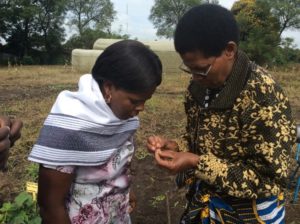
Photo 3: On the left, Dr. Madata providing practical training to Edith Kadege (one of the research scientists) at TARI Selian in 2017.
What is your message to PABRA in its 25th anniversary?
Dr. Madata: PABRA has done a lot and it is still doing a lot! PABRA must prepare itself for the challenge ahead which she believes PABRA has an answer, she urges for PABRA to prepare itself, search for the problem and assist the farmers. Happy 25 anniversary to PABRA!

